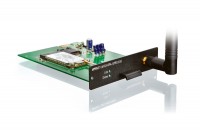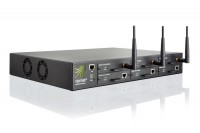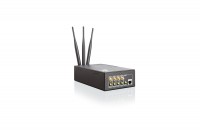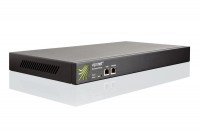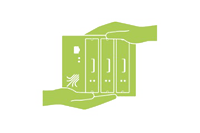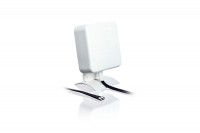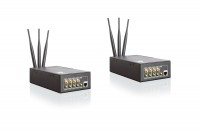Falck Danmark A/S
Saving lives by remote diagnosis
Early and appropriate treatment in medical emergencies can save lives and minimize long-term harm. Ideally, treatment should start in the ambulance while it is on its way to the hospital. Furthermore, if the patient has a potentially serious condition, directing them to the appropriate hospital and unit is also vital, so the medical team there can ensure that the necessary treatment resources are available. This is where telemedicine and eHealth solutions come into play. Transmitting relevant patient data like physiological parameters to specialists in the hospital, and making it possible for the ambulance crew to stream high-definition video from the ambulance facilitates major improvements in patient care. Falck Group, a leading
Nordic-based health solution company with a global presence in 45 countries, has equipped ambulances in Denmark with Viprinet technology to enable the transmission of diagnostic information including live video images directly to medical professionals.
Benefits of Viprinet's solution
- Reliable connectivity – including in rural areas
- High definition, quality video transmissions
- Starting treatment as soon as possible
- Remote diagnosis
- Massive cost savings
The challenge
Providing reliable IP-based data transmission from and to moving vehicles is per se no easy task. When using mobile phone networks, it needs to be taken into consideration that each mobile radio cell only covers a small area, so that receivers in motion have switch to new radio cells frequently. An additional challenge in this project is that these ambulances operate in rural areas in the north of Denmark with poor network coverage. Nevertheless, Quality of Service (QoS) requirements for the underlying network are extremely high, given that it’s used for emergency healthcare and aimed to protect patients’ lives.
Therefore, this infrastructure must be reliable, high-bandwidth, and low latency given the real-time nature of the traffic passing through it. The transmission of patient physiological parameters in emergency situations necessitates a connection with no packet loss. Given that these connections also must deliver hundred per cent available and stable high-definition video from the ambulance to the hospital, ensuring that there is enough bandwidth available wherever the ambulance is has also been a decisive factor in choosing the Viprinet solution.
Implementation
Viprinet’s solution to Falck’s requirements is using WAN bonding technology to bond several mobile phone network connections into one single VPN link, providing aggregated bandwidth from all the bonded networks and ensuring reliability and security. Viprinet Multichannel 500 Routers have been installed in each ambulance and equipped with four 3G SIM cards each, ensuring uninterrupted connections. Viprinet’s specialized streaming optimization software was installed on all these routers in order to provide optimal quality video and data connections. Falck tested the Viprinet solution for nearly two years in a variety of scenarios before introducing this lifesaving technology in the field. The implementation was carried out in cooperation with Viprinet’s Danish distributor Sharecon, which offered assistance throughout the process.
Result
Falck have been using the 500 model of Viprinet Multichannel Routers for more than 3 years in ambulances in the north of Denmark, in close collaboration with the Northern Region, with consistently positive results. Ambulances now have hundred per cent connectivity, and high-definition video transmission. Beside video transmission the system will enable stable transmission of patient data. In order to start treatment as soon as possible, doctors need to be able to see, for example, the color of a patients’ skin in detail to detect symptoms. The Viprinet bonding solution deployed here ensures that there’s always enough bandwidth to transmit video without interruptions. A doctor in a hospital, hundreds of kilometers away, can now view the patient in high-definition instantly using his iPad, smartphone, or computer and make a preliminary diagnosis. This represents a huge improvement in patient care. Furthermore, before Viprinet technology was deployed, the doctor potentially had to travel to the patient, meaning that two or more hours of the doctor’s time might be used up. Being able to remotely diagnose the patient in less than ten minutes has resulted in cost savings for the health sector as well.
Partners involved
Sharecon A/S
41 Generatorvej
2730 Herlev/Denmark
www.sharecon.com/vpn
Customer Opinion

Kjeld BrogaardUsing Viprinet technology to equip our ambulances has not only dramatically improved patient care, but has also led to huge economic savings.
Customer Profile
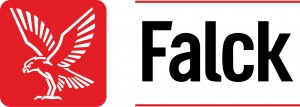
Falck Danmark A/S
- Business sector: Health Solutions (assistance, emergency, healthcare and safety services)
- Headquarters: Copenhagen, Denmark
- Established: 1906
- Company sites: Present in 45 countries Providing ambulance services in 19 countries
- Number of Employees: 34,000
For further information visit Falck.dk (Danish)
Project Facts
Ferndiagnose in Rettungswagen
Eingesetzte Hardware:
- 10 Multichannel VPN Router 500
- 1 Multichannel VPN Hub 2000
Projektstart: 2013
Downloads
| Download | Size |
|---|---|
| 620.62 KB |

